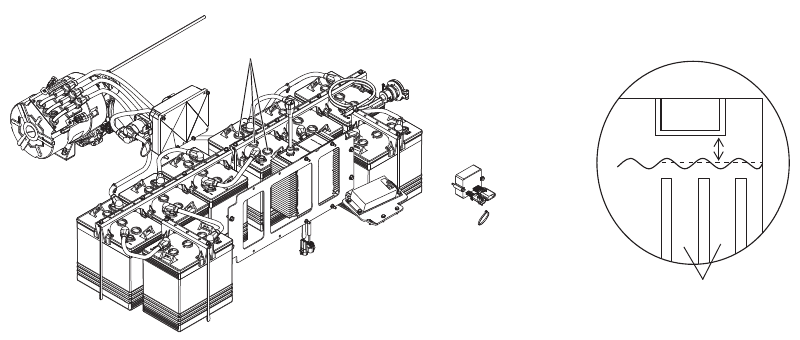
56
MAINTENANCE
Batteries
Battery Cleaning
Always keep battery terminals and connections free of corrosion. To clean, remove corrosion
with a stiff wire brush. Wash with a solution of one tablespoon baking soda and one cup
water. Rinse well with tap water and dry off with clean shop towels. Coat battery terminals
with dielectric grease or petroleum jelly.
NOTICE: Do not allow cleaning solution or tap water to enter the batteries.
Battery Replacement
With proper care and maintenance as outlined in this owner’s manual, battery life could be
extended up to four years or longer, depending on the amount of use. When battery
replacement is necessary, please see your authorized GEM dealer.
WARNING! Handling batteries and electrical components improperly can result in serious injury or
death. Do not attempt to remove batteries or battery cables. Always see your dealer for battery-related
service.
Battery Disposal
Lead-acid batteries are recyclable. Return whole scrap batteries to a distributor,
manufacturer or lead smelter for recycling. For neutralized spills, place residue in acid-
resistant containers with absorbent material, sand or earth and dispose of in accordance with
local, state and federal regulations for acid and lead compounds. Contact local and/or state
environmental officials regarding disposal information. You can also contact GEM Customer
Service for information. See page 1.
Battery Fluid
A poorly maintained battery will deteriorate rapidly. Check the battery fluid level often. Add
only distilled water. Tap water contains minerals that are harmful to a battery.
Unless the plates are exposed before charging, distilled water should be added to a battery
after charging. If the plates are exposed, add water to about 1/8 inch (3 mm) above the plates,
then charge. Check the fluid level again after charging. Maintain the fluid level 1/4 inch (6
mm) below the bottom of the fill well in the cell cover. Do not overfill.
Plates
1/4” (6 mm)
Fill
Well
Cell Covers


















